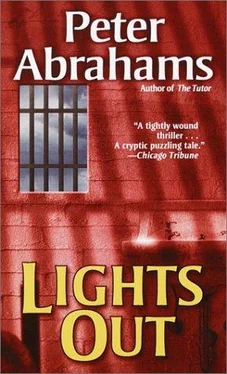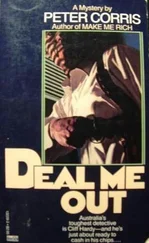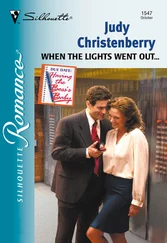Peter Abrahams - Lights Out
Здесь есть возможность читать онлайн «Peter Abrahams - Lights Out» весь текст электронной книги совершенно бесплатно (целиком полную версию без сокращений). В некоторых случаях можно слушать аудио, скачать через торрент в формате fb2 и присутствует краткое содержание. Год выпуска: 2002, ISBN: 2002, Издательство: Fawcett Books, Жанр: Триллер, на английском языке. Описание произведения, (предисловие) а так же отзывы посетителей доступны на портале библиотеки ЛибКат.
- Название:Lights Out
- Автор:
- Издательство:Fawcett Books
- Жанр:
- Год:2002
- ISBN:978-0345445780
- Рейтинг книги:4 / 5. Голосов: 1
-
Избранное:Добавить в избранное
- Отзывы:
-
Ваша оценка:
- 80
- 1
- 2
- 3
- 4
- 5
Lights Out: краткое содержание, описание и аннотация
Предлагаем к чтению аннотацию, описание, краткое содержание или предисловие (зависит от того, что написал сам автор книги «Lights Out»). Если вы не нашли необходимую информацию о книге — напишите в комментариях, мы постараемся отыскать её.
Lights Out — читать онлайн бесплатно полную книгу (весь текст) целиком
Ниже представлен текст книги, разбитый по страницам. Система сохранения места последней прочитанной страницы, позволяет с удобством читать онлайн бесплатно книгу «Lights Out», без необходимости каждый раз заново искать на чём Вы остановились. Поставьте закладку, и сможете в любой момент перейти на страницу, на которой закончили чтение.
Интервал:
Закладка:
Eddie took his hands off JFK, rose, walked to the tarpapered window, peered through one of the coin-sized holes. He saw a goat straining its tether to get to the leaves of a dusty bush just out of reach.
There was a noise behind him. Eddie turned, saw JFK crawling desperately off the mattress. He got hold of the chair, pulled himself up, his movements weak and agitated at the same time; trying to reach eye level with Eddie. He gasped for breath: “But I tries to warn you, man. On the boat radio.”
“Warn me about what?”
“Mr. Packer he call ahead to the harbor police in Lauderdale, man. For reporting a stolen boat. No problem, except I know what be on this stolen boat, man. I get on the radio in the bar, to be warning you don’ go to no Lauderdale. But Mr. Packer he come in the bar, see me, shut off the radio.”
“Did he know what was on board?”
“No, man. It be just the three of us know.”
“The three of you?”
JFK held up three fingers, long and delicate, counted them off one at a time.
“Me.”
Eddie nodded.
“Mandy.”
Eddie nodded again.
JFK touched his third finger. “And Jack.”
“Jack?”
“Jack your brother.”
“Jack was in on it?” An image came to him, lit by a beach fire: Jack’s hands and forearms, scratched as if by heavy gardening.
“Equal partners,” said JFK. “I the owner of the ganja, Mandy she have the buyer in Miami, Jack have the boat. I be aksing you first, but you was saying no to me.” JFK’s body, supported by his grip on the card-table chair, began to tremble. The feet of the chair rattled on the floor.
Jack had been in on it. That explained why the search for JFK had been a sham-a real investigation would have implicated him too-but it didn’t explain everything. “Did Jack know Packer called the harbor cops?”
“Sure he know. We all right there in the bar-me, Packer, Jack.”
“And Jack didn’t try to stop him?”
“He try. He say why be making it police matters? Packer he say to teach you respect for property. Not just the boat-the girl too, that be his system of thinking. They argue back and forth.”
“But Jack didn’t tell him about the dope?”
“How he do that without he incriminating hisself? Instead he tell Mr. Packer come out on the beach, for talking private. That give me the chance to call you. But Mr. Packer he smart. He come running back in, rip the plug out of the wall.”
“That was all?” Eddie said.
“All?”
“All it took to stop my brother?”
JFK thought for a moment. “Like he could hit Mr. Packer on the head or thing like that?”
“If he had to.”
JFK shook his head. “No way,” he said. “Mr. Packer he use his hold on your brother.”
“What hold?”
“He say one more trick and you don’ be gettin’ the seven and a half percent.”
“That stopped him?”
“Seven and a half percent of everyt’ing, man. The hotel, the time share, the golf, the marina. Could have been millions, maybe. Millions. You understand the forces of the situation?”
Eddie understood. Understanding had a physical component; at first it was all physical: a light-headedness, as though he were much too tall, and fragile, like some strange bird. Then came the mental part, the fact of what Jack had done to him and the way it had happened. But not how Jack could have done it to him. He wanted one thing: to ask Jack that question.
Eddie stood motionless in JFK’s hot room, unconscious of passing time. His mind was far away, in a cold northern place of pirate games, of hockey, of falling through the ice. He thought of all that, and more, but failed to find the reason why. Just the MacGuffin, the bookstore boy had said, a device. There was no explanation. Would he have to accept that, in the poem and in his own life? Silence thickened, tangible, immobilizing. JFK broke it by saying, “Hey! You all right?”
Eddie grew aware of JFK leaning on the card-table chair across the room, separated from him by golden bars of light. The light burnished all his bony parts, as though they were already exposed.
“You better lie down,” Eddie said.
JFK nodded, made his way to the mattress, sat, used his hands to pull up his legs, lay down. Eddie could hear him breathing, fast and shallow. After a few minutes he groaned, then breathed more slowly. He looked at Eddie.
“Too weak, man. But I be wanting you to know.”
“Know what?”
“That it wasn’t me.”
Eddie nodded. “More water?”
“Not a drop to drink.”
“Why not?”
“Too far to go, all the way down from ninety-seven percent. Nine or ten, maybe. I could reach it from there. But not ninety-seven.”
Eddie opened the backpack, took out a wad of bills, put them in JFK’s hand.
“What this?” said JFK.
“For medicine, the doctor, whatever you need.”
“Your brother’s money?”
“Mine.”
“You got money? That be something, anyway.” JFK’s eyes went to the Marley poster: “One World.”
“I be wanting to make a little confession,” he said.
Eddie waited.
“JFK no be a gay man.”
“You said that.”
“But he be doing some gay things at one time, despite his own self.”
“So what?” Eddie said.
There were no buses in Cotton Town, no jitneys, no taxis. Eddie borrowed JFK’s rusty bicycle, promising to send it back from Galleon Beach. In fifteen years he had made no plans other than to quit smoking, to take nothing with him, to have a steam bath. He had realized all of them, not hard to do. The hard part was knowing what you wanted. And now Eddie knew. He wanted a house on a bluff and a bay for swimming. There were other islands. He bicycled north, toward the airstrip and a flight to the next one in the chain.
It was hot, the road bumpy, the pack increasingly heavy on his back. Eddie was aware of all those things, but they didn’t bother him. He was alive, he was free, he had money, all he would ever need. He tried dividing fifteen into $488,220. Thirty-two thousand and something per annum, as though he had spent those years teaching high school: not an excessive return.
Eddie pedaled JFK’s bike. The track widened slightly, grew smoother. Soon he would see the white house on the bluff, the hippie house with the peace sign on the roof. Five or ten minutes had passed without a single thought of Jack. That was good. That was the way it would have to be. He came to the bluff, saw a lane leading up to the house, paused.
A dust cloud rose in the distance, over the treetops. It drew closer, like a small approaching storm. A car appeared beneath the dust cloud, sunlight glinting off the windshield. It topped a rise a few hundred yards from Eddie, going fast, much too fast for the road. He pulled to the side, got off the bike.
The car roared by, so quickly and spewing so much dust that Eddie didn’t see the driver at all. He pushed JFK’s bike back on the road, adjusted the backpack, got ready to remount. Then the car made a shrieking sound. Eddie looked in time to see it skidding sideways, wheels locked, on the edge of control. But not out of it: the car spun around and came toward him, slower now. The dust began to settle, leaving a little smudged dome across the sky.
The car stopped beside him. The door opened. Karen got out.
32
“The world is much smaller than you think,” Karen said.
They stood on the Cotton Town road, Karen beside her car, Eddie at the head of the lane leading to the hippie house.
“I’m familiar with the concept,” Eddie replied.
Karen laughed, a complex sound and not particularly friendly. “Maybe it’s Jack who’s not.”
He saw himself reflected in her sunglasses, two uncertain little Eddies, leaning on their bikes.
Читать дальшеИнтервал:
Закладка:
Похожие книги на «Lights Out»
Представляем Вашему вниманию похожие книги на «Lights Out» списком для выбора. Мы отобрали схожую по названию и смыслу литературу в надежде предоставить читателям больше вариантов отыскать новые, интересные, ещё непрочитанные произведения.
Обсуждение, отзывы о книге «Lights Out» и просто собственные мнения читателей. Оставьте ваши комментарии, напишите, что Вы думаете о произведении, его смысле или главных героях. Укажите что конкретно понравилось, а что нет, и почему Вы так считаете.












